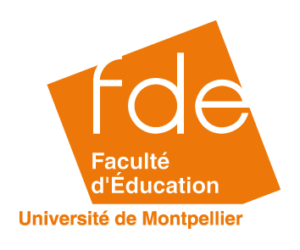ViSA Days 2017


The LIRDEF is organizing the nextViSAdaysat the Faculty of Education of the University of Montpellier on March 30 and 31, 2017.
Getting to the Montpellier Faculty of Education:
From Montpellier St Roch station: streetcar line 1 direction mosson, stop at stade Philippidès
From the airport: take the shuttle bus to the Place de l'Europe stop, then take streetcar line 1 towards Mosson to the Stade Philippidès stop.
[gdlr_divider type="solid " size="50% " ]
How and why should we combine "filmed observation" with other types of data to build a "terrain" and understand the complexity of professional practices?
[gdlr_divider type="solid " size="50% " ]
To study professional practices in different fields (education, health, sport) and gain a better grasp of their complexity, researchers often film the professional situations they are interested in (teaching/learning situations, training/mentoring trainees, sports practices, health care, etc.) using a particular framing (close-up and/or wide shot) and a chosen point of view (external and/or subjective) deemed relevant to their object of study. They very often supplement this video collection with other data: documents, observation notes and/or interviews of various types with the players, which may also be video-recorded (simple and/or cross-confrontation, look-alike instruction, explicitation, ethnographic interview, comprehensive interview, semi-directive interview, etc.).
- Do video-recorded data from professional situations have the same status as other data?
- How are the choices and articulations between methods conceived and implemented within the same discipline? Under what conditions are these links possible?
- Can we think of multidisciplinary (e.g. between didactic approaches, activity approaches and language approaches) and possibly interdisciplinary methodological enrichments that could lead to joint projects? What would be the advantages and limitations of this?
To this end, and to achieve the other goals usually targeted by ViSA, these days will focus on three complementary dimensions:
- Formative: presentations aimed at researchers (or trainee researchers) wishing to use video for their research, as well as the ViSA database (deposit and request);
- Epistemological and methodological: conferences to address the issues inherent in the types of collection complementary to a video corpus;
- Experimental: conferences or workshops to present (or discuss) work carried out by research teams.